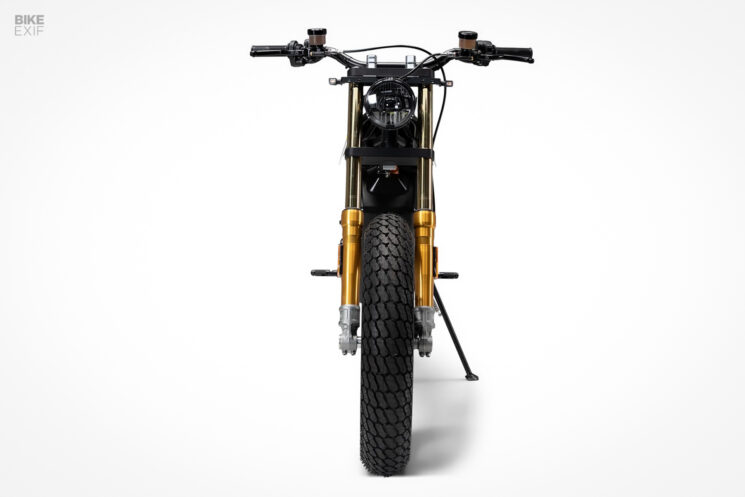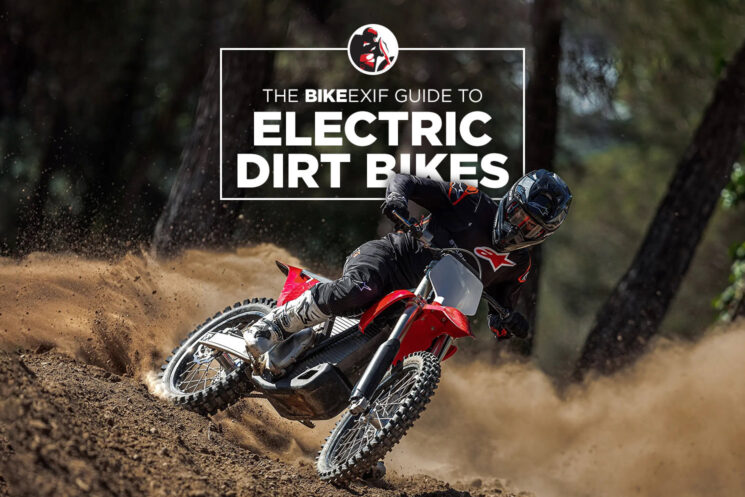
We’re purveyors of the finer elements of internal combustion, and as such, we treasure things like the symphony of mechanical parts at high rpm, the feel of a perfectly executed gear shift and the puff of exhaust smoke from a rich mixture on a crisp morning. With that in mind, it can be difficult to get charged up over the latest electric dirt bike offerings for 2024, but hear us out.
Skipping over the typical buzzwords that come about in the EV discussion, we want to bring up just a few considerations for two-wheel enthusiasts to keep in mind. Remember that recreational off-road riding areas require a lot of property and understanding neighbors. These locations are closing every day, thanks in no small part to noise, and countless enthusiasts have to make do with smaller rec areas—making electrics and play bikes more attractive options.
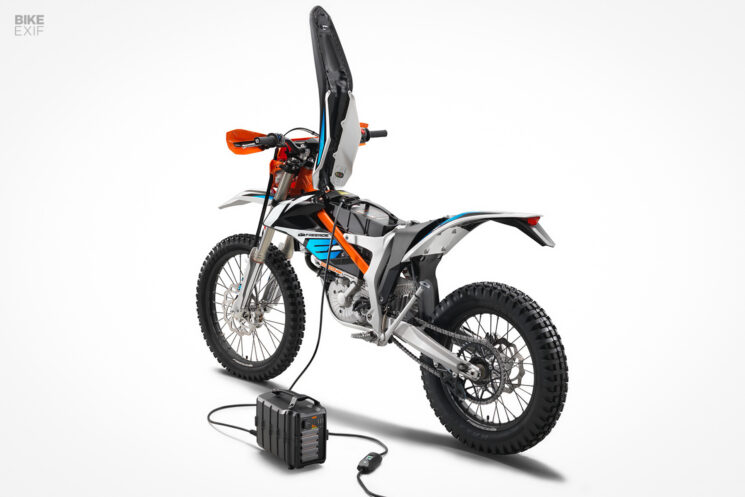
Another factor is maintenance, as not every budding enthusiast is capable of changing oil, adjusting valves or rebuilding a top end. Also, the clutch and gearshift are the biggest hurdles to climb for new riders—both moot points on an electric.
We’re not trying to convince anyone of anything, and as such, we don’t see pitting EVs against conventional MX bikes as a worthwhile exercise. Instead, it’s about evaluating what you expect from a riding experience, and you may be surprised by what some of these machines have to offer.
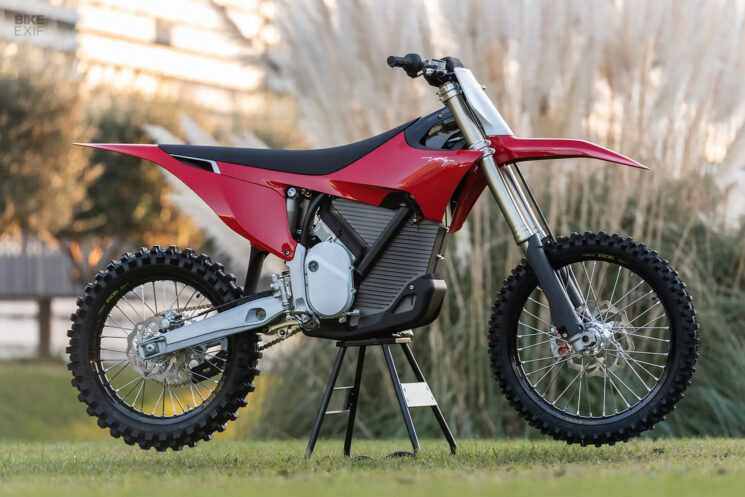
Stark Future Varg There are plenty of options on the market in the realm of electric play bikes, but the Stark Varg is one of the few models that could seriously change motocross. With a staggering output of 80 hp, Stark claims the Varg is 30% more powerful than conventional 450 MX bikes, and says it’s the most advanced electric motorcycle in the world.
A European-built carbon-fiber sleeve motor is the heart of the Varg, delivering a claimed 664.5 lb-ft at 14,200 rpm (yes, you read that right). The motor weighs just 19.8 lbs, and its water-cooled aluminum casing is a structural part of the chassis. The whole system is controlled by an integrated Android phone, offering full customization of the power curve, engine braking, virtual flywheel effect and traction control. More than 100 different riding modes can be programmed if you feel so inclined.
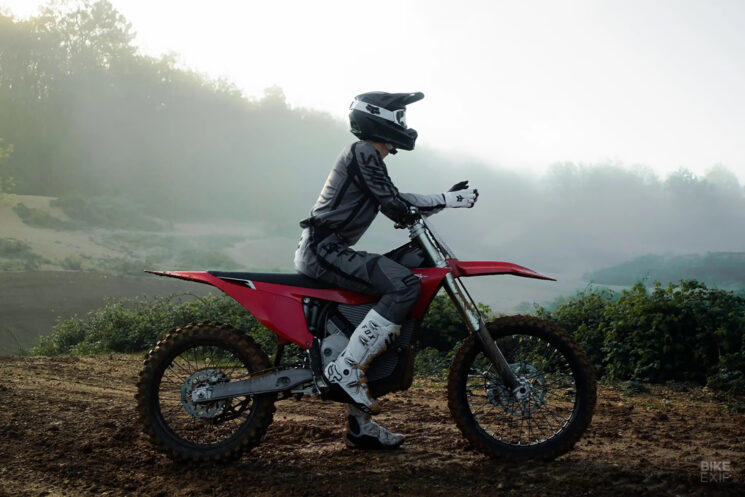
The Varg is a lot like what you’d expect the electrified future of motocross to look like. The bodywork is sleek and ergonomic, and numerous carbon-fiber bits are used in its construction. The absence of a fuel tank, radiator and exhaust system keeps the bike slim in the saddle, and weight is competitive at 243 pounds. Quality components from Kayaba, Brembo and Pirelli complete the package.
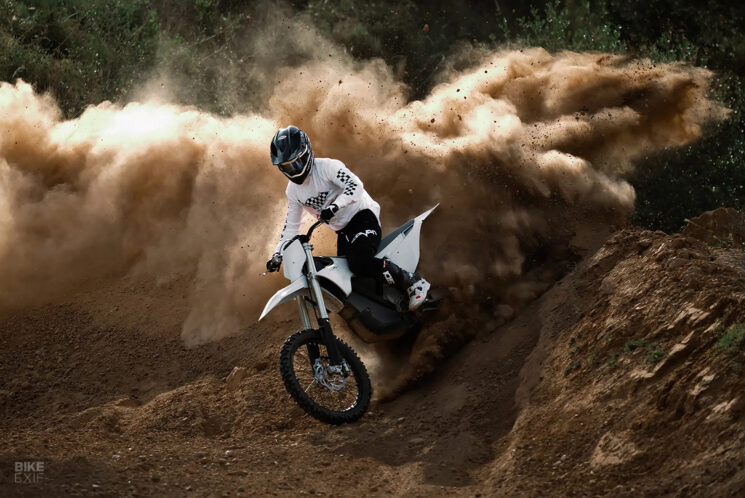
Battery stats on the Varg are also impressive, as its 6.5 kWh battery pack will return up to six hours of easy trail riding, or a full moto heat with the power turned up. Depending on the charger and outlet used, the battery can be topped off in an hour or two, and its air-cooled magnesium case is waterproof.
Considering its technical specification and staggering output, the Stark’s MSRP isn’t quite the blow we expected. Currently, a Varg can be reserved for $12,900 with an expected delivery of December 2024. [Stark Future]
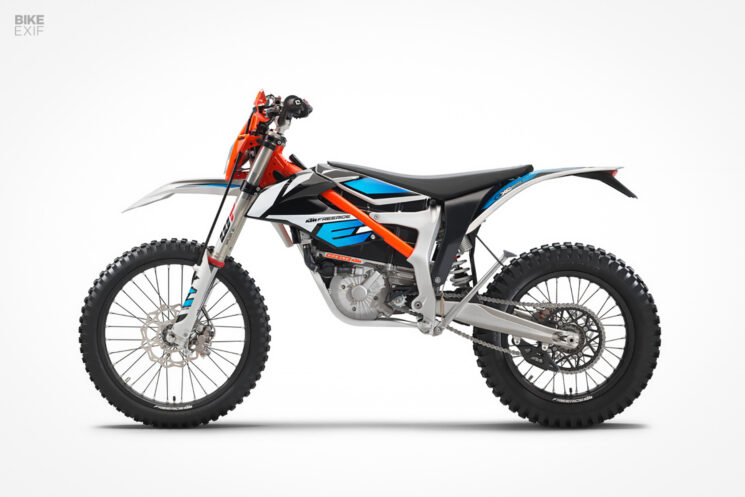
2023 KTM Freeride E-XC KTM’s model designations are rarely prescriptive, but the Freeride E-XC is somewhat of an exception. Originally designed as a lightweight gas-powered machine, the Freeride mixed trails and trials prowess to form the ultimate flickable play bike, and it’s no surprise the brand chose to expand its electric offerings here.
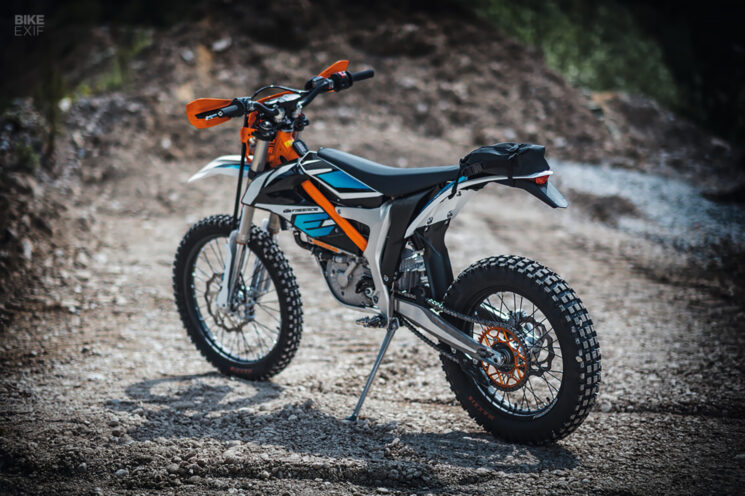
The Freeride EX-C is based on a unique chassis with a chrome-molybdenum frame with bolt-on aluminum subframes. The subframes and the bushless 18 kW motor are stressed members, and the compact powerplant keeps the whole bike slim and the center of gravity low.
Trials influence is evident in the 13.4” of ground clearance and steep steering angle, and the pegs are mounted further back to promote stand-up mobility. CNC hubs are laced to aluminum Giant rims, and lightweight FORMULA brakes bring things to a halt. Adjustable WP XPLOR suspension is fit front and rear.
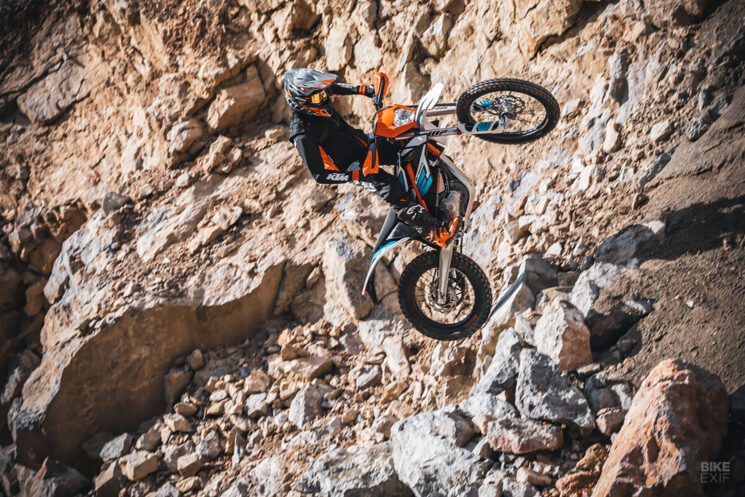
A water-cooled 3.9 kWh battery pack powers the Freeride. It’s quick change, enabling longer excursions with an extra battery, and it’s submersion proof as well. Three selectable riding modes control acceleration, top speed and regenerative capabilities, and a limp mode is automatically engaged when the battery reaches 10%. Entirely dependent on riding style, the battery can return between 90 minutes and 3 hours of run time. A 220 V outlet supplies a full charge in 110 minutes.
The Freeride EX-C has always been its own animal, and the versatile play-bike platform adapts well to EV power. That said, it’s certainly not cheap for a play bike, priced at $11,299. [KTM, R. Schedl]
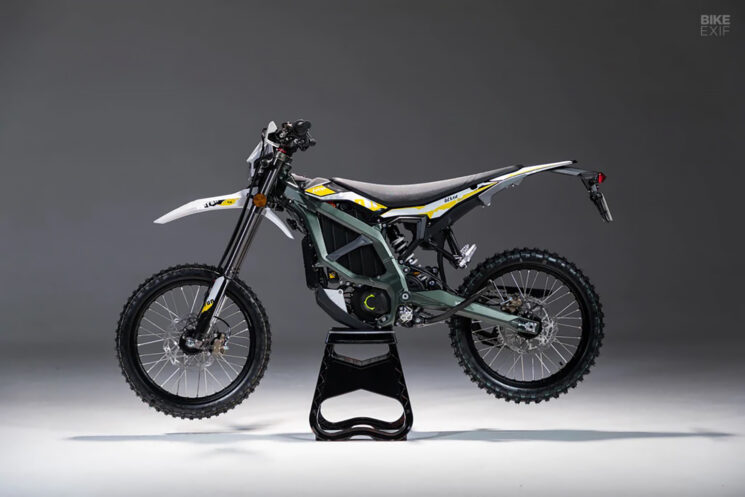
Surron Ultra Bee Surron busted onto the scene a few years back with the Light Bee, a revered pit bike-size electric, but the company turned things up quite a bit in 2023 with the release of two full-size bikes. While the Storm Bee is the company’s most conventional dirt bike (and their most powerful offering), we think the Ultra Bee is the smart money.
Let’s get the big numbers on paper right off the bat—325 lb-ft of torque and 187 pounds at the curb. Surron accomplished that featherweight figure by keeping the bike as slim as possible (the Lithium-Ion battery pack weighs just 45 pounds), but the bike is also a few inches shy of a full-size machine in most dimensions.
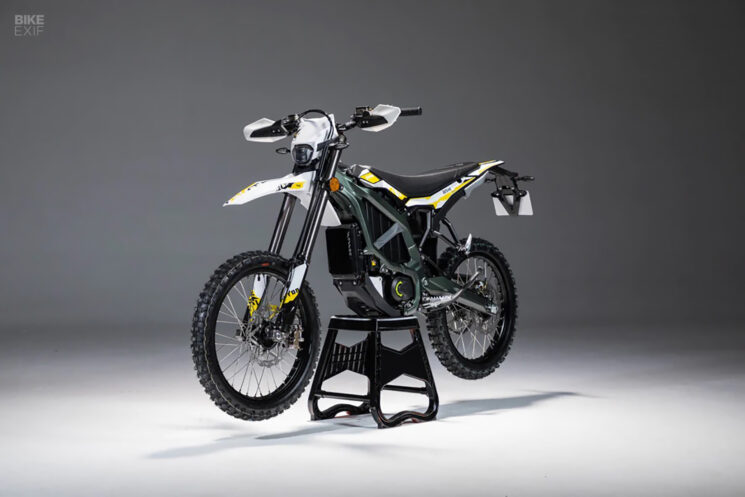
The Ultra Bee’s permanent magnet synchronous motor supplies 12.5 kW peak power, and will travel a maximum of 87 miles on a full charge. While the actual range depends heavily on the riding mode and use of the throttle, the Ultra Bee is said to be good for several hours of play riding. A complete recharge is accomplished in about four hours, and Surron claims the battery can be recharged 1,500 times before the battery health drops below 80%.
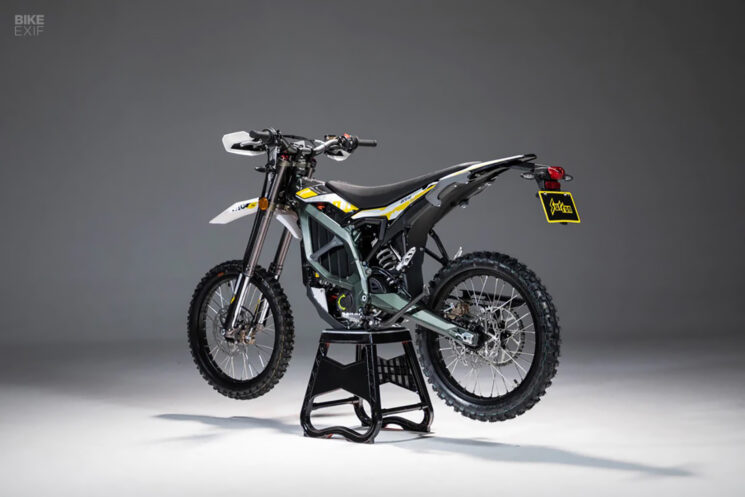
Equipment on the Ultra Bee is traditional dirt bike fare but scaled down a bit from full MX machines. Suspension travel comes in right around 9.5,” spoked wheels measure 19” front and rear and the frame is aluminum. While not sold as a street-legal machine, the Bee comes with front and rear lighting and a license plate holder.
Our big takeaway from the Surron Ultra Bee is this. It’s certainly quick based on the specs (even if it does top out at 56 mph), but consider what you’re getting for the price point—as the Ultra Bee sells for just $6,499. [Surron]
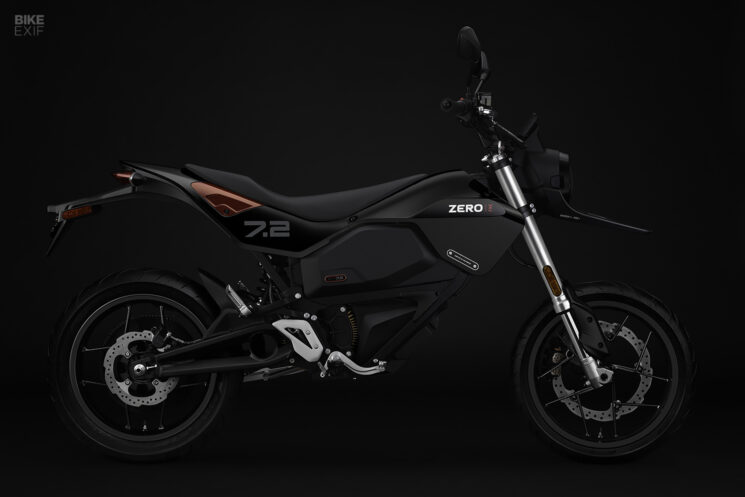
Zero Motorcycles FXE Looking across Zero’s models, you probably wouldn’t pick the FXE looking at stats alone. The sumo-inspired FXE doesn’t have the top speed or nearly the range of the S- or DS-Line machines, but it turns out that’s not the point. A compact package with a sporting image, the Zero FXE is a punchy commuter designed to carve through urban environments effortlessly.
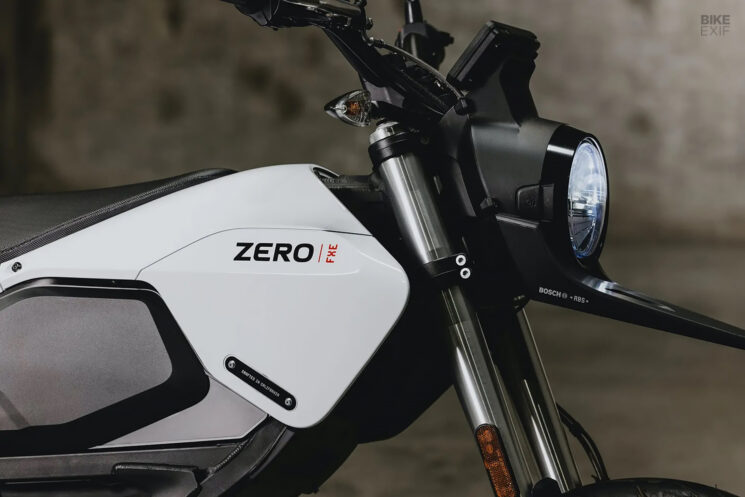
Zero Motorcycles’ FXE is based on the company’s proven air-cooled 75-5 Z-Force Interior Permanent Magnet motor, delivering a maximum output of 78 lb-ft of torque and 44 hp. Motive power is supplied by a 7.2 kWh Lithium-Ion power pack with an integrated 650 W charger. In the real world, the FXE will do 85 mph in Sport mode, or return a 105-mile city range in Eco mode where the regenerative capabilities can shine.
The FXE’s chassis is pretty handsomely equipped for fun as well. Suspension is fully adjustable Showa, Bosch Gen 9 ABS is fitted and the 17” wheels wear Pirelli Diablo Rosso II rubber. The whole package weighs just 309 pounds and the seat height is an accessible 33.” All said, the FXE is more of an EV supermoto than a dirt bike, but Zero also offers the all-terrain FX model if you feel like splitting hairs.
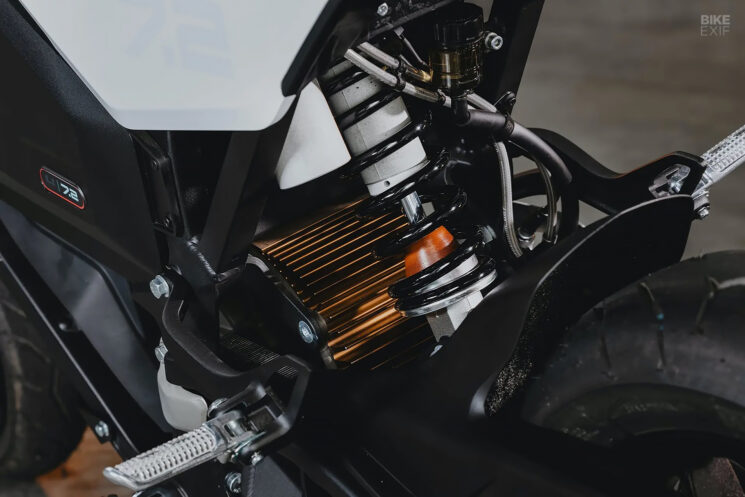
Recharge times aren’t the FXE’s strong suit, as topping the battery off through a standard 220 V input can take over 9 hours. That can be cut down to a much more manageable 1.8 hours if you want to spring for the spendy accessory chargers, but again, that FXE isn’t designed to be a long-haul rider.
Fit for thrifty urban commuting, with just enough equipment for some hooliganism on the side, we get the Zero FXE’s program. Out the door, the FXE will set you back $12,495. [Zero Motorcycles]
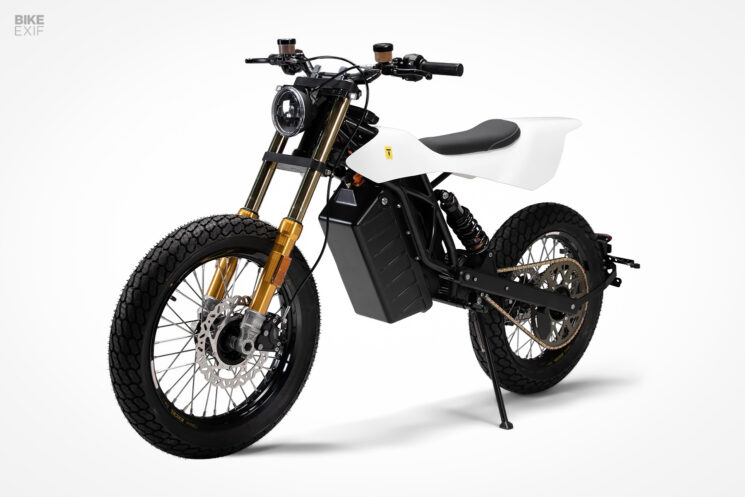
Trevor Motorcycles DTRe Stella The lines between e-bikes and motorcycles are blurring more every day, and popularity in the segment is booming with commuters, hooligans and more. Trevor Motorcycles’ DTRe Stella is one such machine that we’re hot after, combining minimalist cycle appeal with top-caliber components.
Trevor Motorcycles are hand-assembled in Belgium, based on slim trellis frames and electric power plants from Saroléa. Boasting an impressive top speed of 56 mph, the DTRe Stella is street-legal in Europe and will return a 54-mile range if you’re easy on the throttle. A full recharge is accomplished in 3 hours with a 1 kW charger.
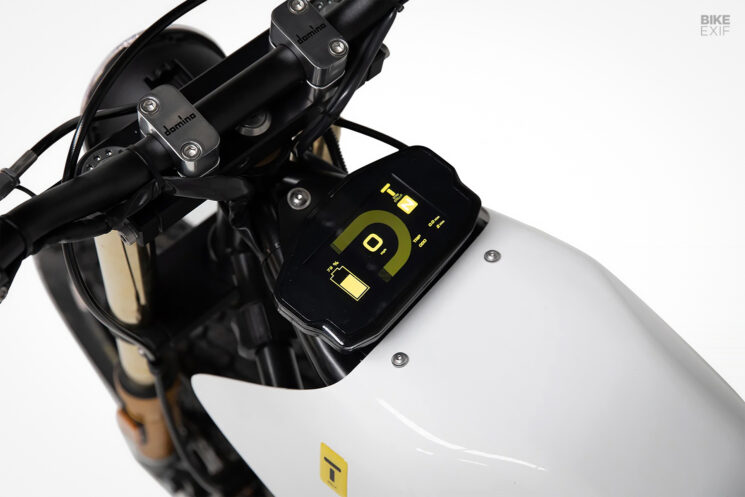
While the performance stats are more than acceptable in its category, it’s the spec sheet that has us won over. The fork is a 43 mm Öhlins, brakes come from Beringer and the wheels are Excel with Mitas H-18 rubber. The DTRe Stella’s one-piece has spirited street tracker style and an LCD dash up front monitors critical functions.
All that doesn’t come cheap though, as a street-legal Stella comes with a $13,139 MSRP, or you can opt for the off-road version for $11,778. [Trevor Motorcycles]
